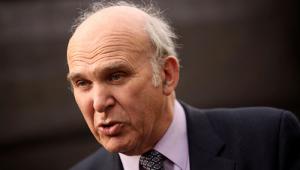Vince Cable, the business and universities secretary, is a man with a problem. Despite Nick Clegg's best efforts, the Liberal Democrats fought the election on a ludicrous higher education policy of scrapping fees. Now, faced with being in charge of HE policy, Cable has to perform contortions to try to get himself off the hook. Hence his graduate tax idea.
Lord Browne's review into higher education funding and student finance already has several options. One is to do nothing. A second is to increase the fee contribution from a maximum of £3,290 to £5,000 or more likely £7,000 a year. A third would simply involve allowing universities to charge what they liked, as they do already for overseas students. A fourth would raise the interest rate on the loans, while retaining the current repayment system, or expect universities to establish their own loans. In any case, universities need to be able to charge higher fees sooner rather than later, though it may be politically unrealistic to do so without a cap.
But under the current system, students get a very good deal. Poorer students receive grants as well as loans. All students can borrow the money they need for tuition and maintenance, and repay it through the taxation system at a modest interest rate as and when they can afford to do so. What they are not required to do is to pay back more than they borrow. And they can be rid of their loan more quickly if they wish to do so and can afford it. In some cases - as with science teachers - employers could opt to repay the loan as an incentive.
Vince Cable thinks all this is terribly unfair. The fact that fees have not deterred students from poorer backgrounds, as the LibDems constantly claimed during the introduction of both phases of tuition fees, matters not a jot. What they are looking for is a backdoor way of raising taxes further on high earners. They want, in Alex Barker's words, a student loan that you never pay off.
But the graduate tax has two other not inconsiderable flaws. The first might trouble Cable's Treasury colleague, Danny Alexander: it raises no money for a long time, as it can only be levied on future graduates. In the meantime, the state would have to pick up the tab at a time of 25% cuts in Vince's budget. Universities could whistle for any money. And it could also encourage a brain drain, as good high earning graduates who wanted to flee their 'debt to society' could work abroad and pay back not a penny.
Rather than performing contortions over the issue, Cable would be better allowing his formidable universities secretary, David Willetts, who had the intellectual good sense to rescue the Tories from an equally daft opposition to fees, to work with Lord Browne's team on getting an answer that keeps UK higher education competitive and achieves the right balance between government and student payments. The future funding of higher education should not be held to ransom in order to rescue the Liberal Democrats from their own intellectual incoherence.
Conor Ryan was senior adviser on education to David Blunkett and Tony Blair. He blogs at www.conorfryan.blogspot.com










